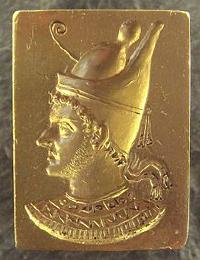Pharaoh Ptolemy VI Philometor
M, (186 BCE - )
| Father-Biological* | Pharaoh Ptolemy V Epiphanes b. circa 210 BCE, d. 181 BCE |
| Mother-Biological* | Cleopatra I |
- Family Lines
- Roy Line
Boudreau Line
Last Edited=13 Mar 2024
Pharaoh Ptolemy VI Philometor was born in 186 BCE.1 He was the son of Pharaoh Ptolemy V Epiphanes and Cleopatra I. Ptolemy was crowned Pharaoh of Egypt upon the death of his father, before he became of age in 181 BCE. Egypt was ruled by his mother, Cleopatra I until he reached his majority.2,3,4,5,1 In 170 BCE, Antiochus IV decided to exploit the weak reign of his nephew and niece to reclaim Palestine, he was opposed by Ptolemy VI. Declaring himself and his sister-wife Cleopatra II no longer subject to a regency (although he was still in his mid-teens), Ptolemy VI followed with an attack of his own on Palestine. This campaign, led as it was by an inexperienced general, was a disaster. Defeated by Antiochus IV, Ptolemy VI fled Palestine in such confusion that he did not even trust in his ability to return to Egypt. Rather, he headed for sanctuary on the sacred Aegean island of Samothrace, a destination he never reached, for the fleet of Antiochus captured him anyway. The military failure, all the more damaging because of Ptolemy VI's "cowardly" flight, led to a revolution in Alexandria where the population briefly replaced Ptolemy VI, both as king and as the husband of Cleopatra II, with their brother Ptolemy VIII. After the capture of Ptolemy VI, Antiochus seems to have had ambitions on the Egyptian throne for himself until he learned of the accession of Ptolemy VIII. Thereafter, he invaded Egypt to return his recent antagonist, Ptolemy VI, to the throne. Initially successful, Antiochus left Egypt in 169 with Ptolemy VI reunited with Cleopatra and reinstalled on the throne, and with a strong Seleucid garrison in Pelusium (the fortress that defended Egypt's frontier from Syria). For Antiochus, there was influence to be gained through a manipulation of the rivalry engulfing the Ptolemaic house, that is, until more calculating heads held sway in Alexandria. Knowing that they needed a foreign champion to check Antiochus IV's ambitions in Egypt, Ptolemy VI and Cleopatra II sent an embassy to Rome to request protection from Seleucid Syria. Responding favorably to the request, in 168 the Romans sent an embassy under Gaius Popillius Laenus to demand that the newly returned Antiochus IV leave Egypt for good. Knowing that the Romans had already soundly defeated his father, and also knowing that they had recently crushed the Macedonians in Europe under Perseus, Antiochus caved in to the Roman ambassador and left Egypt permanently. Hoping to improve their standing through a deft manipulation of marriage politics, Ptolemy VI and Cleopatra initially betrothed their daughter Cleopatra Thea to a pretender, Alexander Balas, who had seized the Syrian throne from its king Demetrius I (150 BCE). When that marriage proved to be politically barren, the same daughter was forced to abandon her first husband to marry Demetrius II (145 BCE), the son of Demetrius I and thus the enemy of Alexander Balas. The latter took both personal and political affront at the Egyptian change of heart. Although Balas was unsuccessful in a military campaign fought in Palestine against the allied forces of Ptolemy VI and Demetrius II (145 BCE), Ptolemy VI died during this war as a result of a wound sustained when he fell from his horse.1,5,3,4
Pharaoh Ptolemy VI Philometor married Cleopatra II, daughter of Pharaoh Ptolemy V Epiphanes and Cleopatra I.2,3,5
See also.
Pharaoh Ptolemy VI Philometor married Cleopatra II, daughter of Pharaoh Ptolemy V Epiphanes and Cleopatra I.2,3,5
See also.
Child of Pharaoh Ptolemy VI Philometor and Cleopatra II
- Cleopatra Thea+ (circa 164 BCE - 124 BCE)
Citations
- Wikipedia: The Free Encyclopedia. Online https://en.wikipedia.org
- Encyclopedia.com. Online https://www.encyclopedia.com/
- Redford, Donald B. The Oxford Encyclopedia of Ancient Egypt. Oxford, United Kingdom: Oxford University Press, 2001.
- Rice, Michael. Who's Who in Ancient Egypt. London: Routedge, 1999.
- Stuart, Roderick W. Royalty for Commoners, The Complete Known Lineage of John of Gaunt, Son of Edward III, King of England, and Queen Philippa, Fourth Edition. Baltimore, Maryland: Genealogical Publishing Company, 2002.
